|
We will miss gatherings like this with the Burmese refugees Rich has taught online for the past few months; it was so good to meet them in person and hear their stories. “Even though he struck the rock so that water gushed out and torrents overflowed, can he also give bread, or provide meat for his people?” Psalm 78:20 Dear Friends,
I (Lisa) read this verse with a mixture of emotions today as I write to share difficult news. On one hand, the psalmist is revealing the truth that God is both able and glad to provide everything his people need, and that it makes sense to trust God for it all. Yet, I do empathize with the people in the moment in which they are asking the question. Their thirst has been quenched, but now hunger is gnawing at their stomachs, and they look around and don’t see a ready supply of food sources. I’m right there with them today. Psalm 78 calls us to “set our hope in God,” (v. 7), and we seek to do that as we face a new circumstance. Recently we asked for prayer for our visa situation. When we came back into Malaysia, we were given 90-day visas and the system seems to have settled back to that, a real answer to prayer. We also asked for prayer for new tenants, and as of a week ago, a family moved in that definitely feels like an answer to our prayers. However, soon after our arrival back in Malaysia we were faced with very difficult choices. We have come to the conclusion that our current family financial model is unsustainable. The costs of my mom’s care have risen dramatically just as her savings have run out. We have been supplementing her costs for the past few months at a level that comes near our monthly salary, and we simply cannot continue to do that. (If she loved her current facility, we might try harder to make it work financially, but she does not. At all.) As we have pondered our options, the most faithful one we can imagine is to move to Durham and move her in with us. We can provide the basic care she needs while still attending to our on-line teaching, prepping and grading. She will eat better food and enjoy a higher quality of life with us while her medical needs are manageable with occasional visits. We have given 30-days’ notice at her facility and will seek housing for the three of us beginning June 1. We will fly back to Durham a few days before that. As you can imagine, we are sad and disappointed to reach this conclusion and to be executing it so quickly. We enjoy most aspects of our life here, the students we serve, and the dedicated folks with whom we serve. Rich will miss the proximity of Malaysia to India and Nepal, where he has had fruitful trips and had hopes of several more in the coming year. Lisa is sorry to cancel a speaking engagement in Indonesia in late June. Kuala Lumpur is a bustling city, and our church is a vibrant community within it; we will hate to say goodbye to folks who have become dear to us here. We write today to ask your prayers for many needs: housing, a car, and furniture being the main ones that come to mind. Regarding housing, we have some specific needs: at least one bedroom on the first floor, a shower rather than a tub, and proximity to our daughter Becca and her husband Avery. Please pray for the right housing and car to emerge, and if you are in the region and have any leads, we would be most eager to hear about them. We want to be sure to communicate that this is not sudden and early retirement for us! At any time Rich and I are involved in preparing, teaching, and grading multiple courses and that schedule is set to continue, mostly teaching in the early morning hours (Eastern Time) instead of late into the evenings (Malaysia time). We fully intend to teach and in other ways contribute to the work of several schools in Asia for the next few years and are grateful for the technology that makes that possible. We believe that this is not a permanent move—we can foresee scenarios in which we could return either to live in Asia or to visit for extended mission trips, including in the coming year. But for now, we are convinced that the place we need to be is Durham, and we trust that God will lead us to one of our “100 homes,” the next stage on our journey. There is much to like about Durham, and we anticipate God has much good in store for us there. Thank you for all your prayers as we make this transition. Please reply to us with any encouragements, ideas, questions or other promptings of the Holy Spirit. Rich and Lisa What great students! They have all been in Malaysia for about 12 or 13 years. Their English is very good and their writing level is just excellent. It was a joy to teach them this past term. (A few of their colleagues are scattered around Malaysia, Australia, and elsewhere and could not be in the picture.)
0 Comments
Lisa preaching on Sunday, March 10, for our church in Kuala Lumpur, Holy Trinity Bukit Bintang, all three services with over 1200 in attendance.
Dear Friends, This past Sunday, I (Lisa) had the chance to preach for our church here in Kuala Lumpur and, guided by the lectionary, I landed on this challenging passage from Numbers 21: “From Mount Hor they set out by the way to the Red Sea, to go around the land of Edom, but the people became discouraged on the way. The people spoke against God and against Moses, “Why have you brought us up out of Egypt to die in the wilderness? For there is no food and no water, and we detest this miserable food.” Then the Lord sent poisonous serpents among the people, and they bit the people, so that many Israelites died. The people came to Moses and said, “We have sinned by speaking against the Lord and against you; pray to the Lord to take away the serpents from us.” So, Moses prayed for the people. And the Lord said to Moses, “Make a poisonous serpent, and set it on a pole, and everyone who is bitten shall look at it and live.” So, Moses made a serpent of bronze and put it upon a pole, and whenever a serpent bit someone, that person would look at the serpent of bronze and live.” While at first I found it challenging to find good news here, I was struck by the severe grace that God brings, turning the people’s hearts back to trust in him, and delivering them from death even as they looked it squarely in the face. I was struck by the Hebrew expression, “their souls were shortened,” and noted that many of us can identify with the feeling of our souls having been put through the dryer and shrunk a bit by the challenges we currently face. I worked with the text in conversation with Jesus’ use of it in John 3:14. “And just as Moses lifted up the serpent in the wilderness, so must the Son of Man be lifted up, that whoever believes in him may have eternal life.” I loved Jesus’ willingness to identify himself and his mission with one of the darkest stories in Israel’s history, letting it tell a new story as he embraced the cross. Here’s a link if you’d like to give it a listen! (The intro and her sermon starts at 13:20 and goes about 23 minutes.) In general, we don’t seek out opportunities to preach in Malaysia since we are here to equip emerging leaders and want to focus our energy on that. (We do preach when we go to Nepal and India because it is a way to model what we teach and bring a word of good news in situations of greater adversity.) But I was glad to do this, filling in for a pastor who was ill, and it was a chance to see up close the remarkable work of our church, which has services in four languages, hosts several conferences each year to equip ministers throughout Asia, and baptized 48 new Christians just two weeks ago. We remain grateful to be able to live in KL and do this work. Read on for three simple joys of life here, three challenges we’re currently facing, and how you can pray for us in the month ahead. Three Joys:
With much affection and gratitude, Lisa and Rich Below: HTBB Online Has Sermons. Click on the image to watch Lisa’s prerecorded sermon… We are enjoying the very rural setting of the Nepal New Covenant College where we will be teaching this week (see below).
2 Kings 20:16-18: Then Isaiah said to Hezekiah, ‘Hear the word of the LORD:17 Days are coming when all that is in your house, and that which your ancestors have stored up until this day, shall be carried to Babylon; nothing shall be left, says the LORD. 18 Some of your own sons who are born to you shall be taken away; they shall be eunuchs in the palace of the king of Babylon.’ 19 Then Hezekiah said to Isaiah, ‘The word of the LORD that you have spoken is good.’ For he thought, ‘Why not, if there will be peace and security in my days?’ Dear Friends, This past week Lisa and I completed a series of teachings on organizational leadership and renewal from the life of Hezekiah. Hezekiah’s is a powerful story, but with a sad ending. He was a good king, and his successes were spiritual, not military in nature. He had a deep vision of God’s people being led into worship of the LORD, and he carried this out. He looked to God when the mighty army of the Assyrian empire was at his door, and God saved him and his people. So, what goes wrong at the end? Why does he leave behind a son who was one of the worst of the Kings of Judah? Isaiah is clear that Hezekiah’s disobedience in showing off the riches of his recent miraculous victory over the Assyrians to the Babylonian emissaries will bring about a Babylonian victory over Judah in the generation of his children, but he has been given 15 more years of healthy life and peace in his kingdom. The news that judgment is coming on Judah should be terrible news, but to Hezekiah it is not an unwelcome word. These remaining years of Hezekiah’s life will be good years, not contingent on his prayers—these peaceful years are already in the bag! For Hezekiah is living on yesterday’s prayers! He prayed prayers of dependence, when he was desperate, and God answered. Now, in his legacy years, he is neither. This, rather than a more faithful posture, is the legacy he leaves his son Manasseh, who was born not during his faithful years but in his semi-retirement years. Manasseh doesn’t ever see his father as the dependent, faithful leader of the nation. This is not an uncommon arc for a leader or an organization. Early challenges and small beginnings make for people of great faith, who trust in God because they must. As the ministry grows due to God-given success, prayer is seen as powerful, driving future growth. Leaders lean on God’s promises and power. But… eventually, continued growth and success often produces a comfortable existence, where the vision of the organization and its resources to meet the vision are at parity. The wineskins into which God poured the fresh wine of his Spirit 20 years ago are now old and crusty. New wineskins are needed, but those at the top of the organization are least likely to notice. They are, in fact, quite happy with “peace and security in my days.” I can see this tendency in myself at times, when I turn to media for comfort or make choices that are safer instead of going deeper in a conversation. Lisa and I are grateful to be reliant on our own and our support team’s prayers for our work here in Asia. While I am close enough to retirement age to wish I could see exactly how our future will be provided for, I cannot. Thanks for being a part of our support team, we are thankful and see God’s active provision to us through your love, gifts and prayers! May we avoid Hezekiah’s complacency and consider how to leave behind a faithful legacy to the next (organizational or biological) generation that comes after us! The Life of a Teacher Lisa and I had a very full Fall 2023 schedule. Between us, we have been teaching this year with seven institutions: St. Paul's Theological College, Alpha Omega International College, Judson Bible College of Malaysia, and Bible College of Malaysia all here in Malaysia, as well as Nepal New Covenant College and the Development Associates International MA program in Nepal, and Lisa has recently begun teaching a doctoral level preaching course (electronically) at Fuller Seminary in Pasadena. Each of these schools works on different schedules and rhythms. We are about to enter the Chinese New Year (CNY) celebration in Malaysia, a two-week break in our courses here. So we are using this break to go to Nepal, where we will each teach an intensive course for a week in Itahari, where I taught in September 2023. After the week in Nepal, Lisa will head back to Kuala Lumpur and I will have another 8 days in two locations in Odisha State, India, with some of my oldest connections in India and their colleagues who will be gathered for a few days of teaching and training. I expect to be serving nearly 200 pastors over the week.
In Jesus, Rich and Lisa More goats below: A supporter couple gave us funds specifically to help the pastors we are working with become more self-supporting in their rural pastoral ministry. These two pastors will be able to provide almost 1/3 of their annual income from the productivity of these goats. (The woman on the right had been a witch doctor and now has an active and powerful ministry among former occult leaders.) Above: Nepal New Covenant College Principal, Dean and Board Members in Malaysia as they consider how to serve some of the nearly 800,000 Nepalis living in Malaysia through NNCC’s Online Degree Programs. Rich and I will return to Nepal to teach at NNCC in February 2024.
“I will instruct you and teach you the way you should go; I will counsel you with my eye upon you. Do not be like a horse or mule, without understanding, whose temper must be curbed with bit and bridle, else it will not stay near you.” Psalm 32: 8-9 Dear Friends (from Lisa), “Would you be interested in teaching a course on Asian Christian Ethics?” The email caught me off guard. I replied that I was hesitant given that I am neither Asian nor an ethicist! Was it even ethical to say yes, given that our goal in being here is to equip others to preach and teach, not replace qualified Asians who can do so? Shouldn’t the land be scoured to find an Asian and/or a properly trained ethicist? My academic friend assured me that I was not replacing an Asian given some other goals for the course, and that she was confident in my awareness of and sensitivity to Asian culture. These kind words were a gift to me after living in this part of the world for nearly two years, stumbling at times in our cross-cultural efforts, but working hard to listen and learn. But was it an Invitation? We get a good number of invitations here as our relational network has expanded, and we are deeply aware of our finitude and thus the need to choose well and seek God’s guidance. I’ve come to distinguish between lower-case invitations and Invitations that, as best we can discern, are from God. Those Invitations seem to be marked by a few features: first, they are ultimately about equipping and multiplying rather than simply a one-off addition to an ongoing ministry here. Second, they are Invitations to us—to grow, to learn, to stretch ourselves in some new way. They cause a spark of gladness and eagerness. For Rich, who has a large body of content at the ready, this often takes the form of a new context, such as the class he recently taught for Burmese pastors living in Kuala Lumpur, or the chance to take his training to a remote corner of Nepal. For me, after prayerful consideration and an initial dive into books with titles like, not surprisingly, Asian Christian Ethics (Aldrin Peῆamora and Bernard Wong, eds), articles on Confucianism, and a refresher on words learned in courses long ago like deontology and consequentialism, I have decided that I can be an adequate guide for this group of M.Th. students, and that I will learn a lot in the process. This course is not until spring, so I have time to get up to speed. I’m on the lookout for Asian guest lecturers for a few sessions, and each student will host an hour on an aspect of ethics in Asia. I am honored and humbled to be given this opportunity to stretch and grow. I wonder if there is a similar area for you—a place where you are discerning the best use of your resources? You may be pondering whether a request to serve on a committee or board or as a mentor is a distraction from your vocation or a new dimension of it. Perhaps you’ve recently heard a disappointing “No” and you’re looking for the Invitation from God within that. Discernment is not easy. We are struck often by the faithfulness of those who read our letters and who support our work here. We know that you, like us, are often seeking God’s guidance amidst ᷈complex situations. I am encouraged by the promise in Psalm 32 that God is eager for us to “stay near him,” and is actively engaged in counseling and instructing us and opening good paths for us. May it be so for you. What’s ahead for us and how can you be praying? Soon, on December 1, I will fly to North Carolina to see my mom. I have discerned that I need to commit to a rhythm of a minimum of two visits a year to her at this stage in her life, and it is my joy to do so. (I will of course enjoy also seeing our daughter and son-in-law!) The same day, Rich will head to India to serve rural pastors in Orissa state but will return a week later so he can attend an event here in KL that will publicize the printing of his recent book here in Malaysia. Please pray for health and stamina as our respective trips bring different challenges: many more time zones for me, and more rugged conditions for Rich. We have other travel ahead in the new year, with more invitations (Invitations?) to India than we can say yes to, and one to Nepal in February. While travel is a part of our work, on a day-to-day basis we are more often engaged in the mundane but good work of grading, preparing a sermon for a school chapel service, or encouraging a passel of young preachers as they preached their very first sermons, as I did last week. Pray for wisdom and kindness as we teach. Finally, we are sure you already join us in praying for peace in Ukraine, Israel, and throughout the Middle East. As always, we are grateful for each of you, and we wish our American friends a Happy Thanksgiving this week! I was a bit startled to have a new friend here blithely invite me to lunch on Thursday (as if it were just any other day!), and replied, “Only if you’ll indulge this American and let us take a moment to share what we’re grateful for.” As vegetarians, we haven’t had a big turkey feast in a few years, but we made some stuffing, sweet potatoes, and green beans for dinner and we gave thanks from afar for many good gifts, chief among them the people that, through their love, prayers and support, make our ministry in Asia possible! We love hearing from you as well, so if you have two minutes to send a brief update, please do. And if you send out holiday family letters, please make ours electronic! Thanks so much. In Jesus, Rich and Lisa Below: Rich’s recent sequence of 7 videos on verbal tools of influence to be a “gentle, humble influencer.” Click on the image to view the sequence in YouTube, or visit this link to find Gentle Exhortation. Above: A great class of MDiv students at Nepal New Covenant College.
Jesus answered, ‘You do not know now what I am doing, but later you will understand.’ John 13:7 Dear Friends, While I’m eager to share our recent ministry joys and challenges, I am distracted and discouraged by the news coming from Israel this week. It is time once again to write a prayer letter, but my own prayers have been focused on Israel and on the growing conflict there. All people of good will pray for peace, but like the protracted war in Ukraine, it is difficult to see how it may be achieved. God is indeed great, but human evil is still quite present in this world. All the more reason to be engaged doing what we are doing here in Asia! Last month Lisa and I were in Nepal for a week, teaching pastors and organizational leaders for their last term in a three-year Masters of Arts degree in Organizational Leadership. I taught the course on Fundraising, and Lisa taught a course on cross-cultural communication and leadership. The 11students in the program were thoughtful and highly engaged. . It was a great week, teaching alongside each other and getting to know the students in that context in Kathmandu. It was inspiring to hear the vision statements of the organizations represented in the cohort, ministries focused around serving teens, orphans, women at risk, and to mobilizing leaders into ministry and church planting. At the end of the week, Lisa flew back to Kuala Lumpur while I went on to a second week of teaching at Nepal New Covenant College, which is a small school in Eastern Nepal. I had taught three courses there via Zoom (during the pandemic),but I had never been on the campus. I taught a course called, Personal Leadership: Navigating Life’s Turns and Disappointments. My previous courses at NNCC focused on leadership, but had been focused more on pastoral and organizational choices and insights. This course focused on topics of failure, burnout, fear, temptation, disappointment, disillusionment, suffering, and death. With all the negative topics, the course was an immense encouragement for students, and over 6 days we spent so much time in Bible study and discussing these challenging topics in deep ways. Almost every day there were moments of tears, or deep sharing, or thoughtful reflections on the parts of the students. One theme for the week is captured in Jesus’ words to Peter, when he was washing the disciples’ feet and Peter was objecting. ‘You do not know now what I am doing, but later you will understand.’ We often experience the hard times mentioned above but our understanding of what God is doing in our lives at the moment is obscured. We don’t NOW know what he is doing, but often later we are given greater understanding and perspective. My hope for this course was to help the MDiv students (some of whom were already serving as pastors) have perspective on the hard aspects of their lives, past, present and future. Of course, the hope is that these discussions will bring them insight into the struggles and issues those they lead will also face. I have taught many different courses in the last three years—but this topic and cohort of students was one of my real favorites. Of course, the topic also is personal to me, and perhaps to many, as the last three years, since the outbreak of COVID, have been a time of mostly not understanding what God is doing, but praying in hope to one day be able to understand. It feels to me that Lisa and I are in a time of reaping some of that understanding, as we are given many opportunities to make a real difference in the lives of students, pastors, and organizational leaders in Asia. I have, on the side, been working on releasing short YouTube videos on some of my teaching topics. If you would like to see short summaries of some of the teaching I did in Nepal, the following videos cover scriptures that I studied with students.
Thank you for making our ministry possible through your gifts and prayers. We love to hear from you! In Jesus, Rich and Lisa Below, Alumni of my past NNCC courses want to take a picture with their professor. I had just presented them gift copies of my book (Sketches of Leadership, volume 1, books 1-3). Now after the king had burned the scroll with the words that Baruch wrote at Jeremiah’s dictation, the word of the Lord came to Jeremiah: Take another scroll and write on it all the former words that were in the first scroll, which King Jehoiakim of Judah has burned.” Jeremiah 36:27-28
Dear Friends, This past week I (Lisa) had the privilege of serving as part of the faculty for a three-day retreat of doctoral students from all over Asia. Since few schools here have the bandwidth to field a Ph.D. program of their own and since some students are working in countries without any seminary, they have creatively combined forces to offer one as a consortium. The work of the Asian Graduate School of Theology (AGST Alliance https://agstalliance.org) is so strategic. The students are highly self-motivated, working mostly on their own and with their doctoral mentor, so these three days together each year are much-needed fuel for their journeys. Their stories inspired me, their wide-ranging topics intrigued me, and as a cohort they filled me with hope for the future of theological education in Asia. I offered devotional reflections from Scripture each day. One day I led us in learning from the model of Baruch. Baruch is the patron saint of writers and re-writers. He faithfully wrote all of Jeremiah’s prophecies into a very lengthy scroll, then boldly read it to the people. When the king got wind of this, he asked for a private reading, at which time he callously burned the scroll a section at a time. What must this have been like for Jeremiah and Baruch? They may have had high hopes for how their (the Lord’s) words would be received. Like many writers (including some of you, in writing or other fields) who put their workout there with vulnerable hope, they experienced a huge setback. It must have been devastating, and hard to understand. They may have assumed it was the end of the road. I imagine it may have been nearly as hard to then hear the words, “Take another scroll…” We talked about the perseverance and faithfulness that it takes to write--and to rewrite-- after a setback. Several students have had life or ministry challenges that caused them to put their projects on hold for weeks or months, and they resonated with the courage it took to reopen their document and begin again. This passage speaks to me personally as well, as we have experienced a season of setbacks that have been hard at times to understand. The end of term and the summer break (which is very brief here) did not roll out as we had planned. As most of you know, my appendix ruptured, and I was hospitalized for several days. Here’s the part we haven’t yet shared: I was fully recovered in time for a rather ambitious itinerary we had planned for early August--a week in Hong Kong with our son and daughter-in-law while we graded and taught final sessions via Zoom, then a flight back to KL with connecting flights on to the US for me and India for Rich. But as the plane from Hong Kong landed in KL, Rich experienced a severe bout of dizziness (vertigo) that made him too unsteady to walk to the next flight. This plunged us into a series of interesting adventures learning about how airport ambulances work here (not well, let’s just say), cancelling tickets, communicating with pastors in India and family in North Carolina, etc. The upshot is that Rich is fine—we met with an excellent ENT back in KL who pinned down the problem to nasal inflammation and got him on good medicine, with no recurrence of dizziness. He did not go to India, but the training events went on, with a key leader in whom he’s been investing doing from all reports an excellent job teaching the material he's developed. We were happy to learn that, but at 3 AM in a small-town hospital outside KL, our well-laid plans in tatters, it certainly felt like a Baruch moment: a confusing, disappointing, and discouraging setback. This week, we are taking up our scrolls again—the AGST retreat will be quickly followed by the beginning of the term at SPTC. Rich has an exciting new opportunity to offer weekly leadership training to some of the many Burmese church leaders who for now call KL home, in addition to ongoing Zoom training in India. On September 16, we will head to Nepal and each teach intensive courses for Development Associates International’s MA in Organizational Leadership. One form of persisting and resilience for Rich has been his foray into the realm of video! The recent illnesses have reminded us both of our limitations and caused him to think about creative ways to extend his reach beyond physical presence or even the synchronous presence of a Zoom class. While I was in the US with family and friends, he hunkered down and learned some video editing skills, and I think the initial results are quite good, and even fun! Check out several recent videos here and subscribe to his channel for more: Successful Failure https://youtu.be/MjXZX814w9Y A Leader Leads by Serving https://youtu.be/-ZmQaIBh71U A Leader Serves by Leading https://youtu.be/WVcCLw83gU8 (If you do watch the videos, please click on the “LIKE” button as it helps me with visibility. I am really just starting this channel, but of course I hope people begin to notice these—from Rich.) One of the things that struck us at the doctoral student gathering was how much the Lord valued Baruch’s writing project. God’s word to him about the king (vv. 29-31) is that he would have no lasting legacy. But Baruch’s life still speaks to us today, calling us to be faithful, resilient, and tenacious. Please pray for us as we enter the fall, a bit sobered by our recent reminders of our finitude, but still eager to give ourselves wholeheartedly to the people and the work to which we’ve been called. Pray for health, stamina, and wisdom. We’re grateful to God for preserving and protecting us and for giving us good work to do, and as always, we are so grateful for each one of you, and for the prayers, financial support, and friendship that makes our work here possible. Rich and Lisa Above: Lisa and Rich back at home together after Lisa’s 5-night stay at the hospital.
Dear Friends, (From Lisa) Thank you so much for your prayers and kind words during my hospitalization. I am not out of the woods, but I am home, taking two strong antibiotics. The infected mass that grew around my ruptured appendix shrank considerably through your prayers and five days of IV antibiotics. It is not gone, my surgeon stressed, and my blood numbers are still not in normal range, so I need to rest and monitor for fever and pain, and go back in for more tests in a few days. But it was delightful to get a full night's rest in my own bed. I had never understood so fully the saying that a hospital is no place to get well or get rest. To all who replied with kind notes, I did not reply but read them all and smiled--I am grateful. We appreciate continued prayers for full healing. Gratefully, Lisa (From Rich) I too am so grateful to have Lisa back, and thankful as well for all the kindness shown us in this time. In other news, I have written a few books! Ten, to be precise. To be clear, they are short and simple, with no footnotes, and they contain many things I have been teaching for about 40 years. The series is called Sketches of Leadership (sound familiar?) and the books are compilations of “Sketches” around different leadership and discipleship topics. Each book contains 10-12 Bible studies that could be used by a small group or ministry team, but of course they can be read by individuals for their own learning and growth. Now, I did not stop my teaching ministry in Asia to write these books. The pandemic produced a great surge in writing energy in me, and my collection of written Sketches of Leadership tripled during 2020-2022. Several colleges in Malaysia and India asked me to teach courses on different leadership topics, which required me to develop new material. This prompted new sketches. I have now put all this into short books (70-100 pages each). I had resisted putting these into book format for over 20 years, since I began developing my leadership material. I am committed to the inductive Bible study process, and my material was delivered almost exclusively as Bible studies intended to be inductively led in small groups of students, staff, church members and leaders, pastors, etc. But in the last year I kept having conversations with pastors and leaders that made me realize that having a more familiar and portable content delivery vehicle such as a series of books would allow me to reach a wider audience, and perhaps more deeply, even though I would trade away my beloved inductive process. I believe these short books will be helpful in Malaysia, India (even in English, but especially in translation) and elsewhere. And I hope that you who read our letters will find them helpful. In the US, these books are now available on Kindle and perhaps eventually in print. For the next few days (through July 12th) they are free on Kindle. So, if you have an Amazon Kindle or Fire (or a Kindle reader on your laptop) you can download free Kindle versions of these books. In fact, if you would do that, then you can write a short review of one or more of these books and that can help them become better known and noticed. If you have any interest in these books, but do not have a Kindle reader, you can download one for your laptop here. You can also find a Kindle Reader app for your phone, but I personally couldn’t imagine reading these on a phone. I encourage you to visit Amazon.com for the complete list of books, although the list is also available on our blog, with more information about each title. Let me highlight a few of the titles:
I have pursued the growingly popular self-publishing route. 1) The process with IV Press takes a long time—from inquiry to published book was almost 2 years, and that was after I already had first drafts completed. I didn’t want to wait to get these vetted and approved by IV Press, which was of course not certain anyway. 2) I wanted to produce books in Malaysia and India that the average person in these countries could afford. I think printed books will be priced at a level of about $2.50 in India and about $4 in Malaysia. Thank you so much for your prayers for Lisa! We were very encouraged by the response.
Thank you for your prayers and notes! They are very much appreciated. If you’d like to read a short sweet lament Lisa wrote about her time in the hospital, visit our blog. Rich and Lisa I’ve just returned from a six-day hospitalization for a ruptured appendix, a malady which went undetected for several days--long enough for a serious infection to set in. Many aspects of this journey, which began three weeks ago with moderate but persistent stomach pain, have been frustrating and confusing. It can be challenging to access medical care in a foreign country. An initial doctor’s visit may have failed to cover all the bases (or it wasn’t appendicitis by that point), it didn’t present in the typical way (no searing pain or fever), etc. At any rate, I am grateful I eventually got the care I needed and pleased with many aspects of that care. But there were moments that hit me hard. Like the lizard fiasco.
I had asked friends on Facebook to post pictures of their pets to cheer me up. An array of adorable dogs and cats soon filled my feed, along with the odd bear in a driveway and the determined raccoon scaling a window. Each one made me smile and buoyed my spirit. Animals of every kind delight me, and I was touched as well by the kindness of my friends. Though I was tied to my bed by the IV drip line attached to my wrist, my doctor wisely encouraged me to seize the moments when it was detached for bathroom breaks and take walks. On the fourth day I was especially bored and lonely (I have an attentive husband but inevitably spent many hours on my own). So, I ventured out to the entrance area where fellow inmates were being released to waiting cars. Out of the corner of my eye, I noticed the tiniest lizard I had ever seen, a bit more than two inches long. I mused that it was the size of the infected mass inside me that we were trying all week to shrink, but cuter and much more diligent at doing pushups. I bent down and watched it fetchingly flex its triceps. I thought, “I’ll take a picture and post it on Facebook as my pet—a “thank you” for all the pet posts I’ve received!” I’d left my phone charging but headed back up to the fourth floor and got it, hoping against hope it would still be there when I returned. I got back just in time to watch a janitor mopping the lizard into a pile. “NO!” I cried. I found it on its back fighting for its life and flipped it back on its belly. At that point the janitor scoldingly shook his finger at me and smashed the little guy to death with his mop. I turned away and silently screamed, and tearlessly wept, shaking my fists in frustration. “Why, God? What cruel trick was that? Why pile that on to my pain, making me come down here to see random suffering?” That remains baffling, just as the whys of this whole appendicitis incident remains a bit of a mystery. I don’t fully understand what hearing from God looks like or claim to know for certain when it is happening. I rarely get more than inklings. But what I heard quite clearly as I pondered it later was, “I did not like watching that either.” This seems right to me—God takes no pleasure in suffering. God cannot or at least does not always prevent it, but God does come alongside. God sees. And God suffers with us, and with this whole groaning creation, even down to its smallest lizards. And musings on creation, from the likes of Lewis, Chesterton, and even Calvin, make me think that God also takes pleasure in watching lizards do their pushups and will one day restore a kingdom where all his creatures are treasured. Setting theodicy aside for a moment, I want to be clear that I am not griping that I live in a country that treats animals poorly. I live in a country in which one janitor was callous toward one lizard. I see well-loved dogs every day here. This is not a cultural reflection. It’s a lament. Life can get hard. My last three weeks were hard. The lizard smash was a microcosm, a visible manifestation of all the hard on going within me. Its one grace was that it afforded me a moment to cry out in visceral lament, instead of just soldiering on. It no doubt hit me harder because I was fragile and worn down—perhaps it was silly to let it upset me. For now, I’m going to keep trying to learn the lifelong lesson from my very small sister, who was always so good at noticing the smallest good gifts life sent her way: I’ll keep delighting in pet pictures, the kind friends here who visited me in the hospital, and tiny lizards doing pushups as long as they have breath. Photo by verdian chua on Unsplash
This is a follow up to our last letter, sent as we just arrived in Nepal. We had a great time in Nepal with the IFES staff team there and we were a good team as we taught on leadership (Rich) and mentoring (Lisa). Lisa returned to Kuala Lumpur and I have been in Orissa State and then in Punjab state the last 12 days, with just a couple more before I return to Kuala Lumpur.
As a reminder, my main strategy in all my teaching here is to help develop the Indian pastors and leaders by teaching and modeling inductive teaching. When they see it done they recognize that their church members enjoy it more, and it retains even young people’s interest far better than the typical style In my sessions. My first challenge is to get people to participate in the Bible study, first by directing them to move into small groups of 3 or 4 to discuss the passage, and then to turn back to the large group to bring their comments out to everyone. It is an unfamiliar process to many, and at first they are shy. My strategy is to be winsome and coaxing—I see some of the pastors are more comfortable speaking with more authority and challenging people, almost (though I cannot tell except by body language and tone) shaming them to participate. But in the end, I do think the coaxing wins them, and they begin to believe I am ready to listen to them, and I do. One… then a second… and then it seems they eventually must speak up, and many are eager to share, on topic, as requested, a question, something they liked or noticed, or a verse they wondered about. And then our Bible study is off to the races. Now these are modified Bible studies—on the small side they are 30 people, on the large side, 180 people. The larger they are the more it is like preaching, and over time in the session I move from eliciting discussion to summary and teaching. But throughout I am asking questions, for feedback or at least rhetorically. And I know they are with me because I see them nodding. My points aren’t made with the dogmatic shouts of the preacher, but with the storytelling logic and reasonableness of the teacher, and typically they like both the style and the content, or so it seems. Today was typical in some ways. After the 3 sessions of teaching ended, I thought people might be tired and ready to leave, but they stayed around for 20 minutes of photos with me, their new friend, the celebrity of the day, posing with families, with teens, with elder men, with young women, with families. And then prayer for a dozen or so, moms with ill children, men and women with body pains (for a very logical reason no doubt given the challenges of their lives), for a man struggling with alcoholism and a woman struggling with demonic oppression. I’m more comfortable with the prayer time than with the photos, but it is clear they enjoyed the teaching and wanted to linger in the day’s humor and lightness a little longer. I spent 7 full days in Orissa State visiting churches and teaching in this inductive style, perhaps teaching 20 times (usually 3 sometimes 4 times daily), with travel between stops, and usually one session with just pastors and lay leaders after they have seen me teaching inductively. Some of the 100 pastors I met in Orissa have been on my Zoom calls, but most haven’t—they’ve been going through the Sketches of Leadership with the Zoom call pastors coaching them. All 100 pastors were being shown a model of inductive teaching that could be tried and learned by them that, as Pastor S said, is both easier and more fun than preaching solid for an hour (while kind of haranguing for a good part of that time, as repetition seems to be the typical way to build an hour-long sermon). So I thought I was going to Orissa to continue to train the 25 pastors I have been teaching via Zoom, but it was really to encourage them while also meeting and training the 75 other pastors and church planters (including many youth and women) in the network, to hear their stories (which was the main point of our leaders’ meetings), to pray for them and encourage them in their work. One of my favorite parts of a journey like this is the opportunity to hear stories, and pastor S had arranged a few gatherings specifically for the pastors and church planters to share stories to encourage both each other and me and to pray for each other.
I have three more days of inductive teaching, training and modeling for pastors and leaders here what I hope they will take up in the coming months. My immediate goals for the Punjab visit are that we begin a Punjabi Zoom call with a dozen or more pastors going through more Sketches of Leadership, after having been introduced to them this week. If there is sufficient interest for that, I have great hope that this work can continue to grow. Please pray 1) for the work and investment here to produce fruit in the lives of the 140 (mostly pretty young) pastors and lay leaders attending these trainings; 2) for health and safe return to Kuala Lumpur; 3) for Lisa and my busy class teaching schedule this Spring term that has already begun for her and for me begins on Tuesday and Wednesday next week! Thanks so much for your interest in our ministry, your prayers and your support! We are grateful to be able to be fully investing in our work here. Please drop us a note if you are able! We always love to hear from you! Rich and Lisa Below: Our view of the foothills of the Himalayas from Pokhara where we were training NBCBS (Nepal IFES) staff! |
Archives
April 2024
AuthorRich and Lisa Lamb Categories |
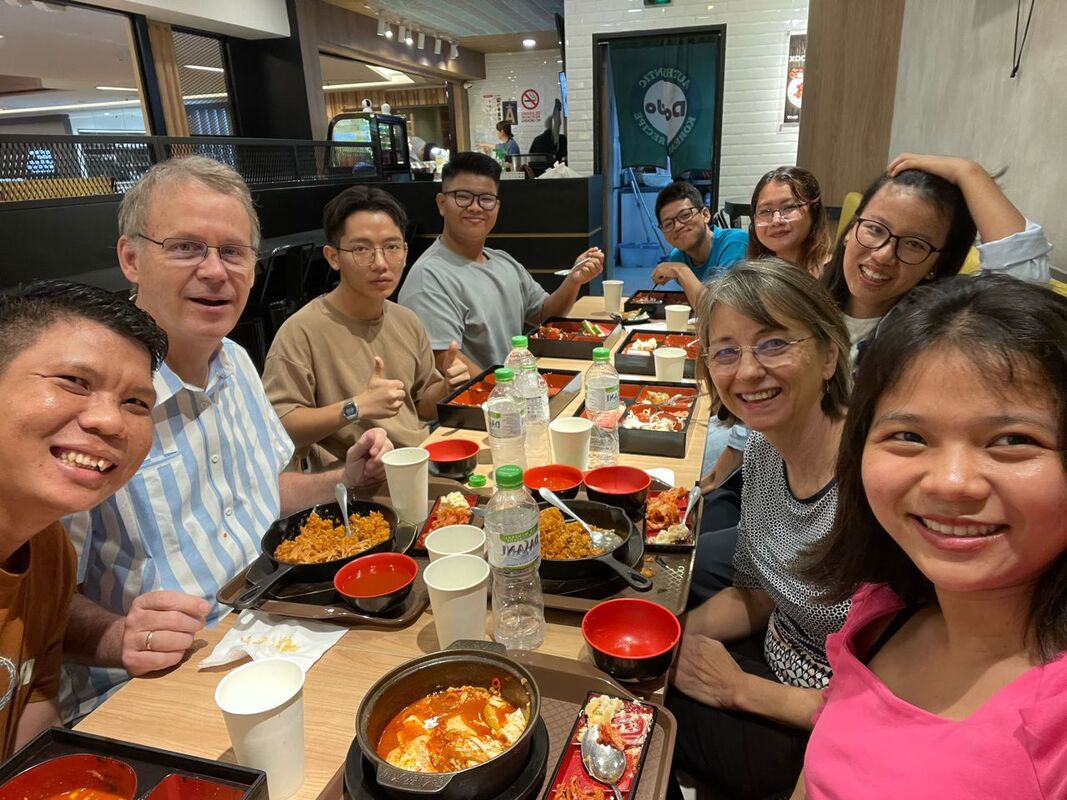
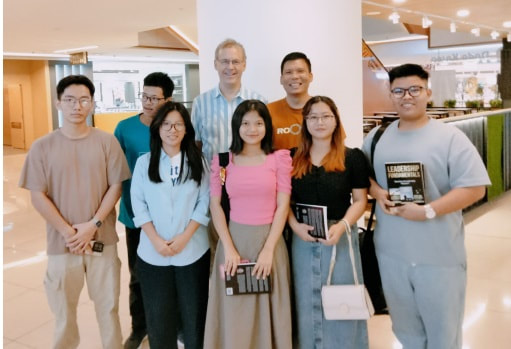
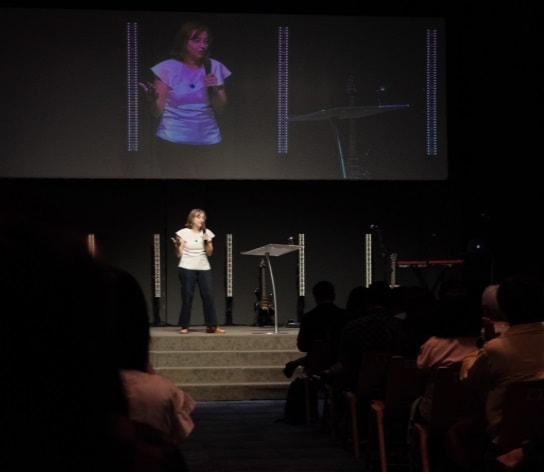
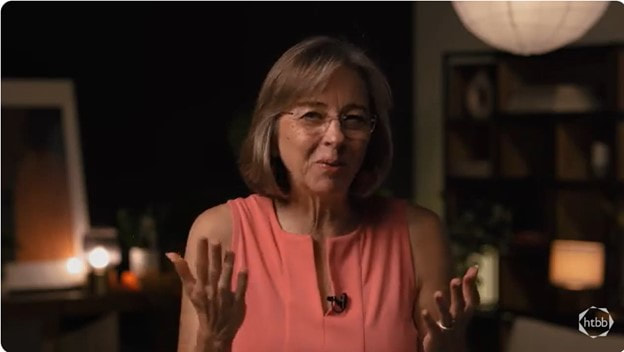
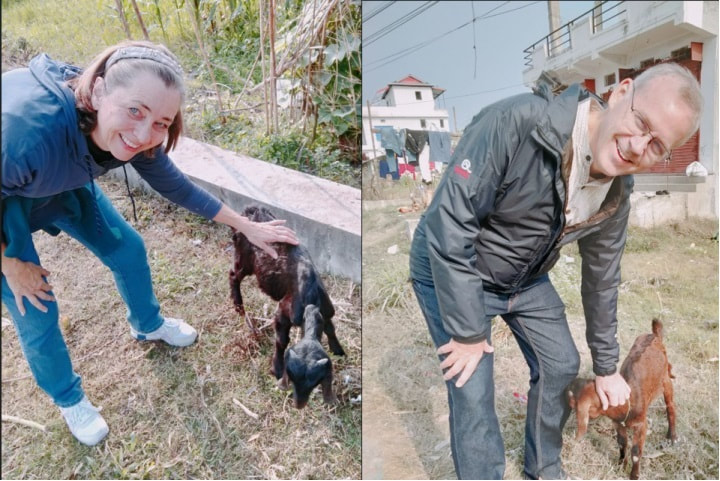
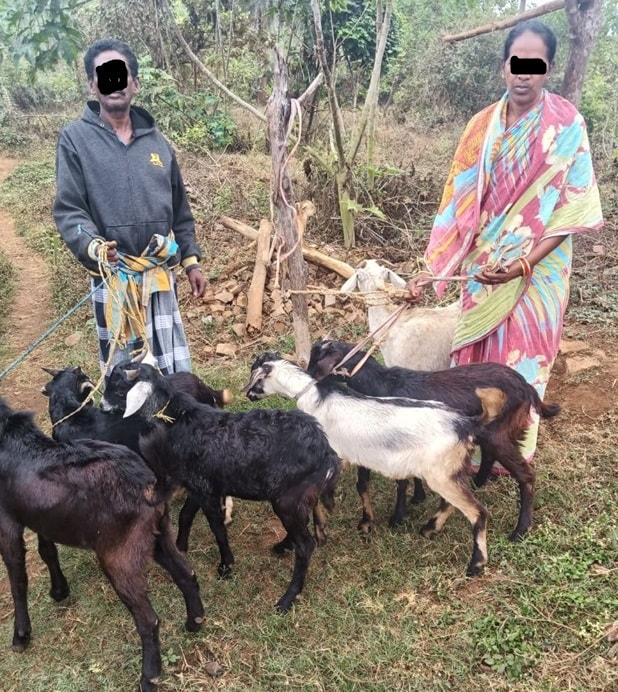
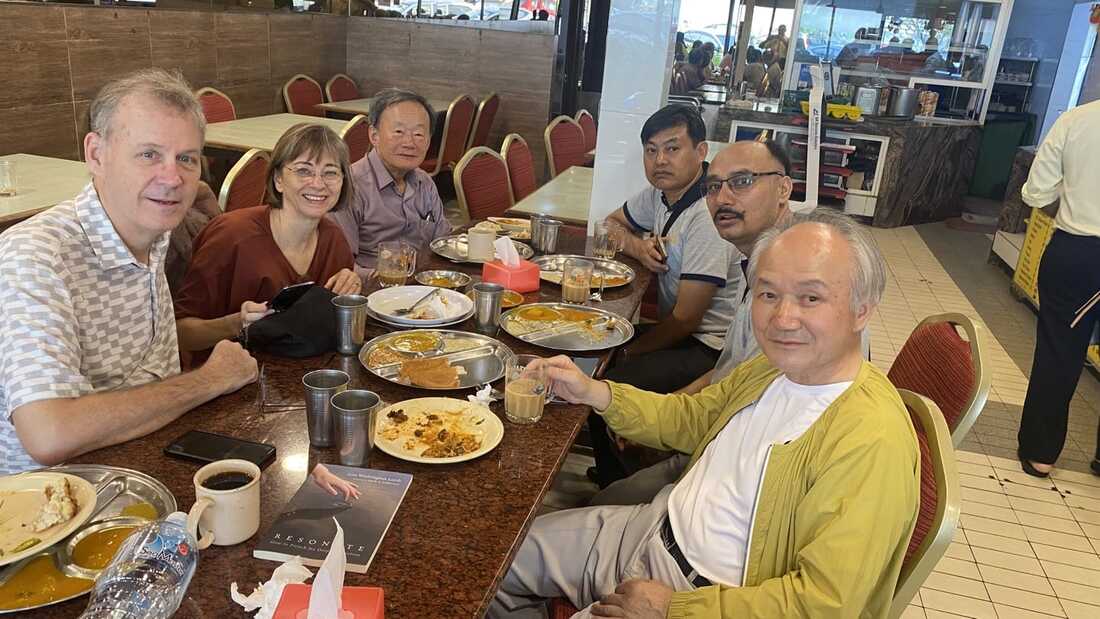
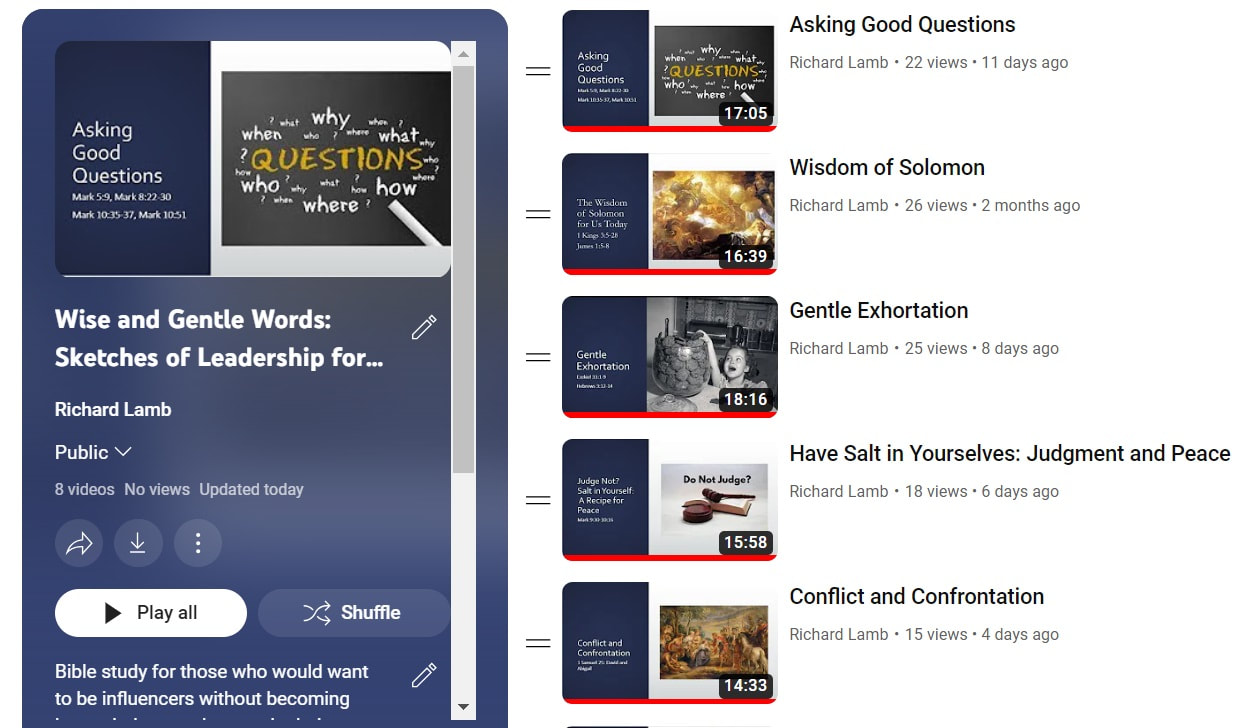
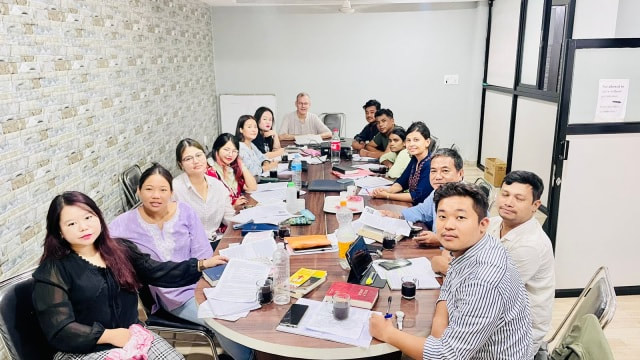
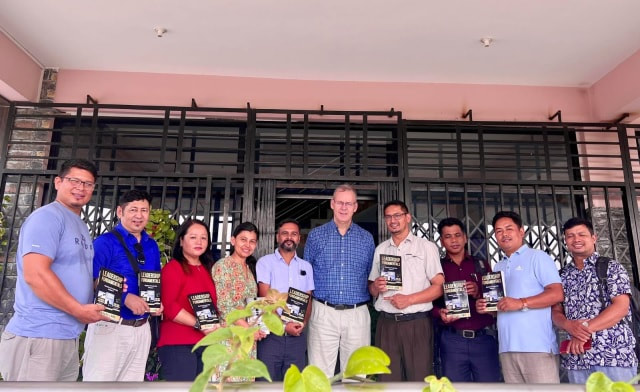
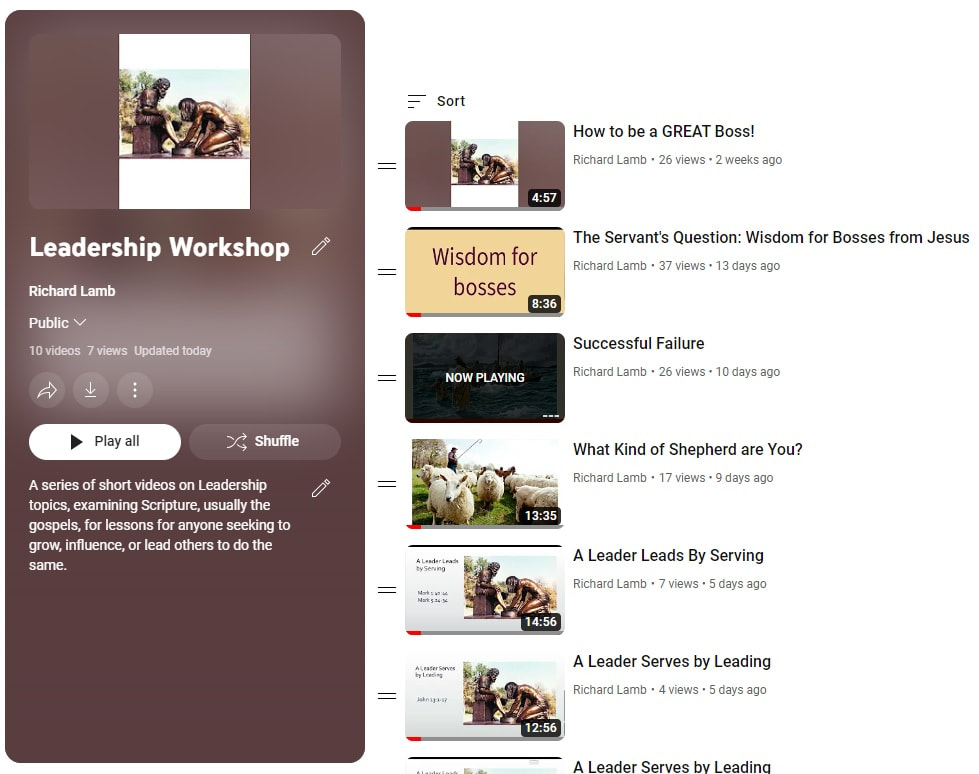
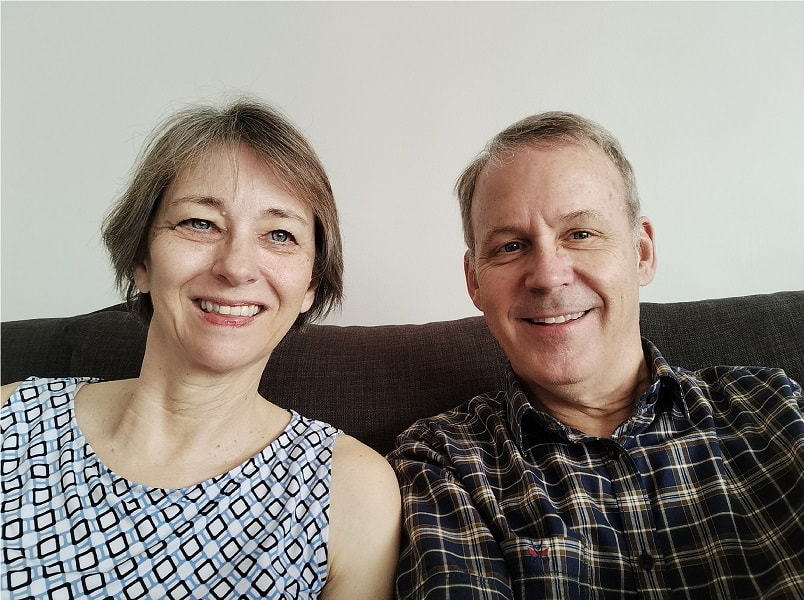
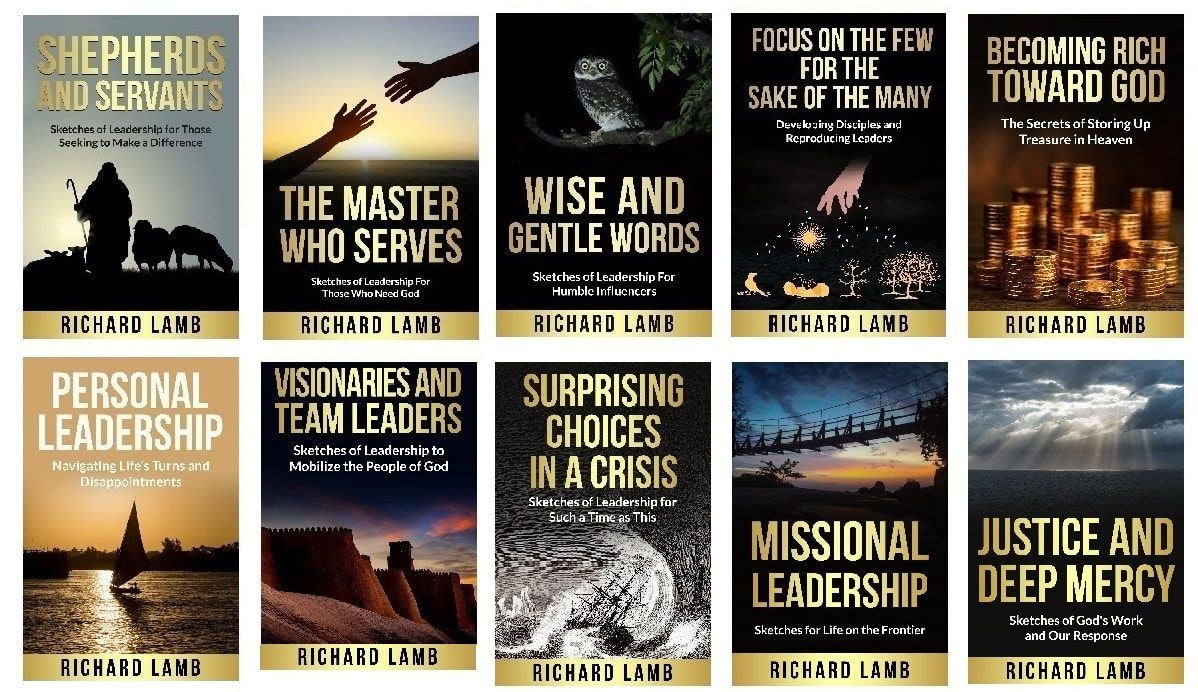


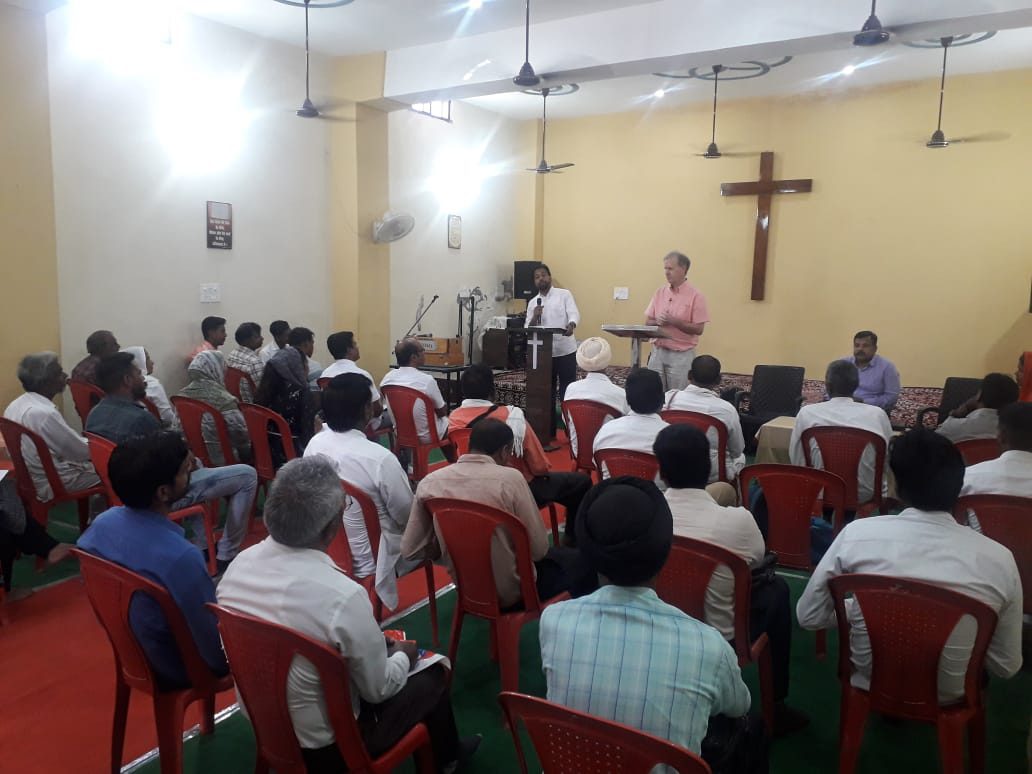
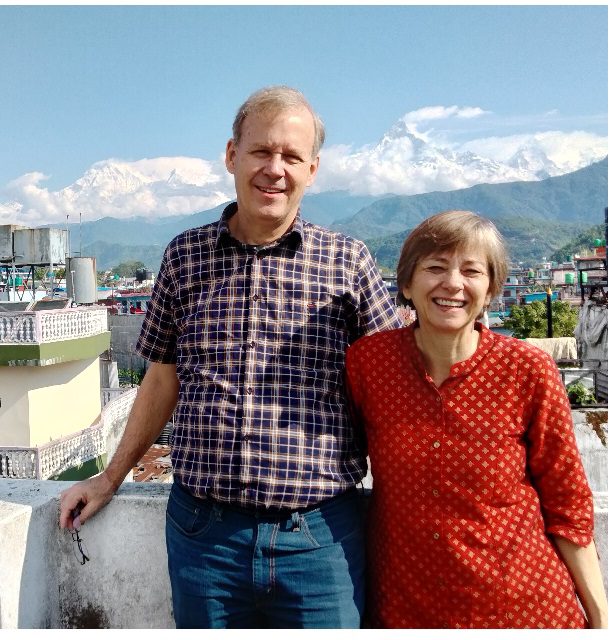
 RSS Feed
RSS Feed